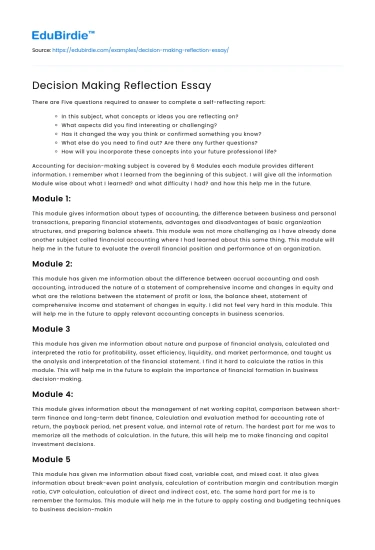Introduction
Decision-making is a fundamental cognitive process that underpins the choices individuals and organizations make. It is a complex interplay of analytical and intuitive thinking, often influenced by personal experiences and contextual factors. This essay explores the reflective aspects of decision-making, examining how self-awareness and critical evaluation can enhance the quality of decisions. By evaluating the theoretical underpinnings and practical applications of decision-making processes, this discussion aims to provide a comprehensive understanding of how reflection can play a pivotal role in optimizing outcomes. The need for reflection in decision-making is underscored by the necessity to navigate the complexities of modern life, where decisions can have far-reaching implications. By integrating theory with practice, this essay will illuminate the multifaceted nature of decision-making and underscore the importance of reflective practices in achieving effective resolutions.
Theoretical Foundations of Decision-Making
The decision-making process has long been a subject of scholarly inquiry, with various models proposed to explain how decisions are made. Herbert Simon's theory of bounded rationality suggests that individuals make decisions within the constraints of limited information and cognitive limitations, often opting for satisfactory solutions rather than optimal ones (Simon, 1957). This theory challenges the notion of the 'rational actor' model, which posits that individuals are fully rational and make decisions by maximizing utility. Reflecting on this dichotomy, it becomes apparent that decision-making is not merely a rational exercise but involves a significant degree of intuition and judgment. Daniel Kahneman's work on heuristics and biases further elucidates this complexity, highlighting how cognitive shortcuts can lead to systematic errors in judgment (Kahneman, 2011). Reflecting on these theories, it is crucial to recognize the limitations inherent in human cognition and the need for reflective practices to mitigate potential biases and enhance decision-making efficacy.
Save your time!
We can take care of your essay
- Proper editing and formatting
- Free revision, title page, and bibliography
- Flexible prices and money-back guarantee
Transitioning from theory to practice, the importance of reflective decision-making becomes evident in real-world scenarios. For instance, in organizational settings, leaders often face complex decisions that require balancing competing interests and scarce resources. Reflective practices, such as debriefs and after-action reviews, allow decision-makers to critically assess past decisions, identify areas for improvement, and apply these insights to future challenges. This iterative process not only enhances decision quality but also fosters a culture of continuous learning and adaptation within organizations. As John Dewey aptly noted, "We do not learn from experience... we learn from reflecting on experience" (Dewey, 1933). By embracing reflective practices, decision-makers can transcend the limitations of bounded rationality and heuristics, leading to more informed and effective outcomes.
Reflective Practices in Decision-Making
Reflection in decision-making involves a deliberate pause to analyze one's thought processes, assumptions, and the impact of decisions. This introspective approach is crucial in high-stakes environments such as healthcare, where decisions can have life-or-death consequences. Consider the case of medical practitioners who utilize reflective practice to evaluate clinical decisions. By reflecting on patient outcomes, they can identify patterns, adjust treatment protocols, and ultimately improve patient care. Such practices are supported by research indicating that reflective practitioners are more adept at critical thinking and problem-solving (Schön, 1983). Furthermore, reflection fosters emotional intelligence, enabling individuals to manage stress and make decisions with greater clarity and empathy.
However, the implementation of reflective practices is not without challenges. Critics argue that reflection can be time-consuming and may delay decision-making in fast-paced environments. Yet, the benefits of reflection often outweigh these drawbacks, as it leads to more thorough and considered decision-making. Moreover, the advent of technology has facilitated the integration of reflective practices into decision-making processes. Digital tools and platforms provide decision-makers with the means to document, analyze, and share reflections, thus enhancing collaborative decision-making. By leveraging these tools, organizations can institutionalize reflective practices, ensuring that they become an integral part of the decision-making framework.
Conclusion
In conclusion, decision-making is a multifaceted process that benefits significantly from reflection. By critically evaluating decisions and their outcomes, individuals and organizations can enhance their decision-making capabilities, leading to more effective and informed choices. The integration of reflective practices into decision-making processes not only mitigates the limitations of bounded rationality and cognitive biases but also fosters a culture of continuous learning and improvement. While there are challenges associated with implementing reflective practices, the long-term benefits in terms of improved decision quality and organizational adaptability are substantial. As we navigate an increasingly complex world, the ability to reflect on our decisions and adapt our approaches will be crucial in achieving sustainable success.






 Stuck on your essay?
Stuck on your essay?

